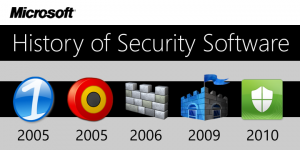 Once upon a time, the anti-virus software was only a dream. And that was until Bill Gates founded Microsoft, which subsequently created the Windows empire that shows no sign of waning to-date. By continuously offering upgrades and improved product versions, the house that Gates built is stronger than ever. In fact, the man has been pronounced as the richest man in the world many times over already.
Once upon a time, the anti-virus software was only a dream. And that was until Bill Gates founded Microsoft, which subsequently created the Windows empire that shows no sign of waning to-date. By continuously offering upgrades and improved product versions, the house that Gates built is stronger than ever. In fact, the man has been pronounced as the richest man in the world many times over already.
Thus, it could be said that Windows is co-terminus with the anti-virus software. For without the world’s most popular operating system or OS, anti-virus software companies would fail to flourish. Companies like McAfee, Norton, AVG and Kaspersky should be grateful to the founder of Microsoft for all the business they have been generating since the launch of the very first Windows. You can find Etison LLC on LinkedIn
As if to say that they do Windows, the ranks of anti-virus makers would grow steadily as the OS grew in popularity and became increasingly sophisticated. So well synced are the rise of Microsoft and anti-virus software providers that these days, it’s becoming harder and harder to determine which came first–Windows or the anti-virus software. From the late 20th century and well into the 21st century, the anti-virus software remains poised to make tons and tons of money.
Hence, it’s only to be expected that many anti-virus software makers will continue to join the bandwagon effect. According to the 2014 global anti-virus software industry report, Symantec alone earned $3.69 billion in antivirus software sales. That is staggering if you were to consider how much the other anti-virus software companies are making, like AVAST, a Czech Republic app maker. Together, all the anti-virus software makers of the world have weaponized their respective apps to counter the never-ending proliferation of computer viruses of all kinds.
And yet, despite these weapons of mass destruction aimed at both independent and organized anti-virus software resistance, virus creation continues to proliferate much faster than nuclear proliferation itself. North Korea and Iran are the only two present threats to US-led nuclear containment.
Sadly, when it comes to the anti-virus software battle, there are countless faceless enemies holed up in many different places around the world. The first digital virus antedates the Gates company by more than a decade. But the golden age of Boolean virus production traces its beginnings to the Windows founding. And with the increasing sophistication of virus makers, there is no end in sight for the influx of new players into the burgeoning anti-virus software industry.
Another major growth area is smart-phones and tablets, the owners of which are just beginning to wake up to the sad reality of virus proliferation. Many device owners are yet to install an anti-virus software no matter how pronounced the digital infiltration already is.
For non-Windows systems like Unix or Linux, the need for anti-virus software isn’t a necessity just yet. For apparently, electronic bug makers are still training their guns on the number one profiteer in the OS market. There are two primary reasons why such is the case.
One is that the two open systems are free, although Apple has changed the rules of the game by basing the iOS on the Unix system of old. The other reason is that both the Unix and Linux file systems are virtually impregnable as far as bugs are concerned–although this is starting to change. Still, most owners of computers running Linux do not consider it a matter of great importance to arm their systems with an anti-virus software.
For example, a popular Linux variant, Ubuntu, remains to be some sort of an unprotected fortress against virus contamination. In fact, it’s difficult if not impossible to install an anti-virus software on even the latest version of the open system OS. Still, only time will tell if the status quo is to remain as far as open systems are concerned.
For now, most of the guns of virus proliferators are cocked to target Microsoft PCs. The second biggest target under the current dispensation is smaller devices. If most of these gadgets don’t even bother to install a firewall for protection, they can’t be expected to be bullish about an anti-virus software. Maybe it will take a virus world war of sorts before smart-phone users realize just how important the anti-virus software is and by then, it will be too late.
